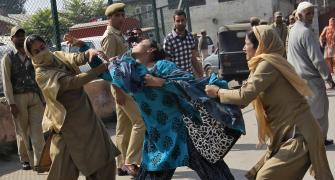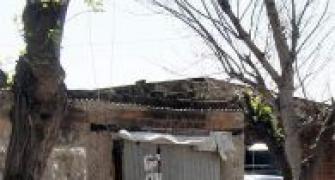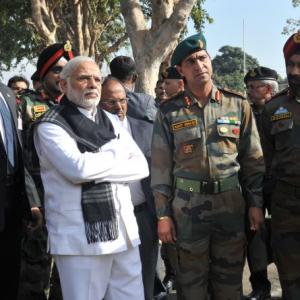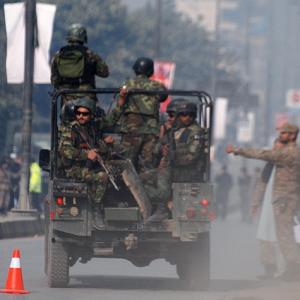'The separatists are representatives of Pakistan.'
'They get paid from Islamabad for propagating that country's policy and conniving in her ploy of accession of Kashmir to Pakistan.'
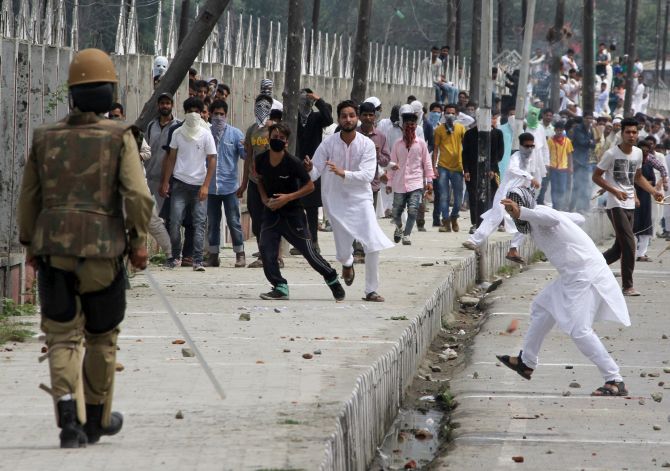
On January 30, 1971, a 17 year old Kashmiri, along with his cousin, hijacked a Srinagar-Delhi Indian Airlines Fokker Friendship flight -- the Ganga -- to Lahore.
In the ensuing drama, the plane was set ablaze after releasing the passengers and the crew. India retaliated by banning overflights by any Pakistan aircraft which severely affected Pakistani troop movement during the the ensuing Bangladesh war.
On December 27, 2015, the 'Ganga hijacker', as he is often called, travelled to Paris with his wife and paid floral tributes at the Place Republique, the mourning site for the November 13, 2015, Paris attacks.
Expressing solidarity with the victims, he left a message which read, 'We (the Kashmiris) feel your pain as we have been suffering from the same violence since the last 25 years.'
After the Pathankot attacks, perhaps the only scathing and unambiguous condemnation from the Kashmiri separatist camp came from this hijacker, who termed it an attempt by the terrorists to scuttle the fresh dialogue process between India and Pakistan.'
The hijacker, Hashim Qureshi, now 62, has metamorphosed into a non-violent political leader.
After the hijacking, he was imprisoned on charges of espionage in Pakistan for 10 years.
In 1986, he left Pakistan and secured political asylum in The Netherlands. After returning to India in December 2000, he was arrested and charged with hijacking under the Enemy Agent Ordinance. Released on bail a year later, he continues to be tried in the special sessions court in Srinagar.
A Dutch citizen, Qureshi applied for restoration of Indian citizenship in 2007, which was denied by the government in 2014. He lives in Srinagar as a Person of Indian Origin.
Author of half a dozen books in English and Urdu, Qureshi, who has emerged as a staunch campaigner against violence in Kashmir, writes columns in the local newspapers explaining his socio-political thought.
After separating from the Jammu Kashmir Liberation Front, the first organised militant organisation in 1994, he formed the Democratic Liberation Party. He also runs a non-governmental organisation for the welfare of victims of violence in Kashmir.
In an interview with Pervez Majeed, Qureshi details his journey from a hijacker to a preacher of peace.
You were among those Kashmiris who started the 'movement' against Indian sovereignty in J&K, and resorted to violence as well. Paradoxically, you are among the first ones to shun it and preach non-violence. What brought about this change?
The change which you are referring to might seem paradoxical, but it is very much explainable and natural. The Ganga hijacking took place when I was only 17. It was also inspired by the global political order of the 1960s and 1970s in which nationalist freedom struggles in post-colonial times were always based on the fundamentals of indigenous armed struggles -- like those in Cuba, Algeria, Vietnam, even China.
After the hijacking, I spent almost 10 years in different Pakistani jails during which I was subjected to torture and humiliation. I also got the chance to read and be educated by a co-prisoner, Maqbool Bhat.
All these things transformed me from an emotional teenager into a thinking young political activist. I realised the futility of violence.
After introspection, I had the courage to change my political thought and wanted to serve as an example for the coming generations that the gun cannot solve the Kashmir issue.
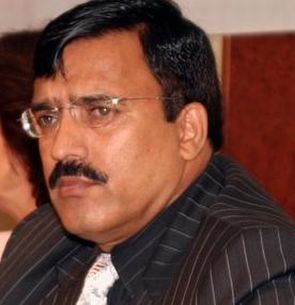 After hijacking the flight, you received a hero's welcome in Pakistan. But you were soon imprisoned on charges of being an 'Indian spy.'
After hijacking the flight, you received a hero's welcome in Pakistan. But you were soon imprisoned on charges of being an 'Indian spy.'
In Kashmir, you are being tried as a 'Pakistani agent.' What is the truth?
Well, the hero's welcome soon turned into accusations and allegations. Actually, the Pakistanis realised that I was actually a Kashmiri who nurtures pro-independence thoughts and is influenced by the Jammu Kashmir National Liberation Front, an indigenous organisation under the leadership of Maqbool Bhat, and that we were asking for an independent, secular Jammu and Kashmir.
Pakistan has never been supportive of the idea of an independent, secular Jammu and Kashmir. It would rather accept the division of Jammu and Kashmir into bits and pieces or even accept its accession to India, but never ever be supportive of the idea of an independent Kashmir.
For them, I was a hardcore enemy. So they kept me and Bhat in jails for nine years.
I feel proud that after my leader Bhat, I am the only Kashmiri who has been prosecuted in both countries of being the agent of the other.
So, the truth is that I am neither an agent of India nor of Pakistan, but, like Maqbool Bhat, I am an agent of Jammu and Kashmir and its people.
I am a 'Kashmiri nationalist'. Both countries always have been labelling 'Kashmiri nationalists' as agents of each other in order to confuse the people of Jammu and Kashmir.
India and Pakistan are working for their own national interests and it suits them to label 'Kashmiri nationalists' as agents of intelligence agencies.
Some 45 years after the hijacking, do you repent putting innocent lives at risk?
I explained to you that this hijacking was done in a different era having a different world order, and that it was not aimed at harming anybody. Nevertheless, it still remains an act of violence. Thereafter, I read a lot. My worldview became rational.
I do repent that act of violence and the fact that I was responsible for endangering lives.
As a young man, you were fascinated by Pakistan and the support that country provided ambitious people like you for the 'freedom of Kashmir.' Later, you distanced yourself from Pakistan. These days you severely criticise Pakistan. What are the reasons?
As a young man, I, like many others, was a victim of propaganda that Pakistan was a friend and a benefactor of Kashmiris. Later, I realised that Pakistan's Kashmir policy was based on its own national interests and its enmity with India.
I have never been against Pakistan or its people, but the Kashmir policy of the Pakistani military establishment and the government is only to befool the Kashmiri people in the name of religion.
They have their own national interests, they have used us Kashmiris as sacrificial lambs and ruined our culture of secularism, brotherhood, tolerance and peace.
I would be disloyal to the soil of Jammu and Kashmir and its people if I would not expose the hideous agenda of others who are bent on ruining our generations.
Most separatist groups in Kashmir appreciate Pakistan for providing 'diplomatic, moral and political support' to Kashmiris.
Who are these separatists you are talking about?
All of them are working for Jammu and Kashmir's accession to Pakistan. They are the local representatives of the Pakistani establishment.
Ironically, they call it a freedom struggle. These separatists are not pro-freedom leaders; they are actually pro-slavery leaders because just for their petty personal and financial interests, they want us to become slaves of Pakistan.
Some people believe that violence internationalised the Kashmir issue.
I don't think violence internationalised the issue. On the contrary, it has defamed our struggle for our birthright of self-determination and turned it into terrorism.
Has there been any commission or committee established at the international level in our support, or to solve the Kashmir issue?
The fact is that the gun has only made it into a bilateral territorial dispute between India and Pakistan and portrayed us as terrorists.
Now nobody on the international platform supports our right to self-determination. The violence has divided us on communal lines, a situation which benefits India and Pakistan.
The political landscape of Kashmir is broadly divided into two thoughts -- one called separatist and another mainstream. In your view, which one is genuine in its political position?
None of them is genuine. One is defending the interests of Pakistan while the other is defending the interests of India. None of them has a pro-people approach. They are the beneficiaries of the conflict, so don't like pro-peace politics.
The genuine political position is represented by 'Kashmiri nationalists' who are secular, pro-peace and work for a united, secular and independent Jammu and Kashmir, which I believe is the only long lasting solution.
You were a close associate of Maqbool Bhat, who is considered the father of the Kashmir freedom movement. In your view, what did he want? And did he espouse militancy?
He was a visionary man of deep understanding and intelligence. His aim was a united, secular and independent Jammu and Kashmir. For that purpose he wanted an indigenous revolutionary people's movement in J&K.
Though he favoured the gun at that time, given the world order and circumstances of those times, but since I know him, I can say with certainty that in the current circumstances, he would have opposed violence and rather started a civil disobedience movement to work for the solution of the Kashmir issue.
He used to say that whosoever tries to divide people on the basis of religion would be the biggest enemy of the people of J&K.
Reports suggest that Pakistan is trying to make Gilgit Baltistan its fifth province. What are the 'Kashmiri nationalists' doing about it?
That is a totally illegal move. As per the United Nations resolution, Pakistan has to vacate the parts of J&K under its control to facilitate a solution. Almost all the so-called Kashmiri separatists have cautioned Pakistan against the move.
Let them launch a movement against this proposal of Pakistan in Kashmir, the way they have launched against India. I am ready to follow them. But will they do that? I don't think they will. Because they know the repercussions!
You are writing your autobiography. What should the reader expect to read which you have not disclosed before?
About the hijacking, the 1971 war between India and Pakistan and the creation of Bangladesh, a lot of people have written books and articles. Most Pakistanis writers and their sympathisers in Kashmir have blamed me for the creation of Bangladesh. They say the hijacking was enacted to give India a reason to attack Pakistan and help Bangladesh secede from Pakistan.
In my autobiography, I have narrated the whole story truthfully, that my hijacking had nothing to do with the India-Pakistan war and the creation of Bangladesh. I have given several details and incidents which I have not mentioned before.
By the way, here in this interview, let me say that I would have felt proud of myself if I was responsible for the liberation of Bangladesh; because those people were facing the worst form of atrocities and barbarism at the hands of Pakistan.
You call yourself a 'secular nationalist Kashmiri.' There are many other people of similar thought, most of who live in Western countries. Why are the 'secular nationalist Kashmiris' not visible and assertive?
The 'secular nationalist Kashmiris' are perhaps not so visible because they are not supported by India or Pakistan or their agencies. Our ideology does not suit these two countries and therefore both have created their unofficial mouthpieces at local and international levels to suppress the genuine Kashmiri voices.
'Nationalist Kashmiris' believe that both countries are the same and should leave our land. This does not suit the interests of these countries. Why would they allow these voices to become assertive?
What are the most pressing issues before the people of J&K?
The most pressing issue is our division; we are divided geographically, ideologically and politically. We should try to unite on an ideological basis.
Until and unless that happens, we will remain victims of terrorism, economic and political exploitation.
We need to build a consensus regarding our future. For that purpose, there is an urgent need of an institutionalised dialogue among all the people of the undivided state -- Jammu, Kashmir, Ladakh, Gilgit-Baltistan and Pakistan administered Kashmir.

